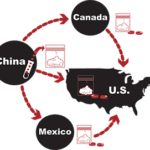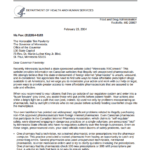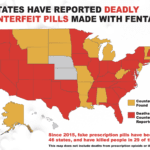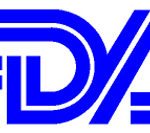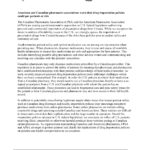Article Topic
Guilty Plea From Canadian Who Sold Fentanyl-Laced Candies Via The Internet
The U.S. Department of Justice announced that Christopher Bantli of Calgary, Canada pleaded guilty in federal court. Bantli distributed controlled substances to customers who made their purchases online. The substances, such as fentanyl, alprazolam, or U-47700, could be pressed to look like “Pez” candies…
[...]Minnesota’s experiment with drug importation: RxConnect 2003-2010
Minnesota’s Experiment With Drug Importation: RxConnect 2003-2010 Minnesota was one of the first states to experiment with drug importation as a way to manage rising prescription prices. In 2003, Governor Tim Pawlenty launched Minnesota RxConnect, a program to import cheaper, non-FDA-approved medicine for Minnesota residents and state employees so that low income and elderly residents…
[...]New Jersey Is The Most Recent State With A Confirmed Death Caused By Counterfeit Fentanyl Pills
Since PSM started following news reports of counterfeit pills containing fentanyl, stories of these pills have showed up in 46 states. With this newest story out of New Jersey, the number of states with confirmed deaths caused by fake fentanyl pills now stands at 31…
[...]National Association of Manufacturers Exec Warns that Florida’s Importation Plan Sacrifices Safety
In this March 5, 2019 editorial, published on the National Association of Manufacturers blog, Robyn Boerstling, the organization’s Vice President of Infrastructure, Innovation and Human Resources Policy, raises concerns about Florida’s drug importation proposal.
[...]Counterfeit Fentanyl Pills Continue To Claim Lives In Arizona
Law enforcement and medical professionals continue to warn the residents of Arizona that any pill purchased on the street most likely contains fentanyl and could kill them. From San Luis to Scottsdale to Buckeye, teenagers across the state are taking these fake pills, sometimes with tragic results…
[...]U.S. FDA Issues A Warning Letter to Canadian “International Prescription Service Provider” CanaRx
The U.S. Food and Drug Administration issued a warning letter to CanaRx, a company that acts as a broker between the foreign pharmacies and the employer-sponsored health insurance plan to provide prescription drugs to their employees. The letter states that CanaRx has been selling unapproved and misbranded drugs to U.S. citizens…
[...]HIV-Positive Advocate Reminds Americans About the Dangers of Imported Drugs
It isn’t just policymakers who believe drug importation will open the U.S. drug supply to counterfeits. In this editorial, published in the Times of Northwest Indiana on March 6, 2019, HIV-positive advocate Brandon Macsata explains that his own physician objected to ordering medicine from Canadian online pharmacies:
“It never crossed my mind that I might have been taking counterfeit medicine, or that the medicines meant to control my HIV could be compromising my immune system. So when my doctor found out, she told me to stop immediately. She warned me that online pharmacies often sell counterfeit drugs.”
[...]South Dakota Man Sentenced To 121 Months After Trafficking In Fentanyl Pills And Other Drug
The U.S. Department of Justice announced that Cory Poelstra of Yankton, South Dakota received a 121-month prison sentence after he pleaded guilty to trafficking in fentanyl. Law enforcement found over 600 fentanyl pills when they searched his home and hundreds of packages that been used to ship online purchases of controlled substances to him…
[...]Head Of Drug Ring That Made 500,000 Counterfeit Pills Each Month Headed To Prison
A South Carolina resident, who was the leader of a counterfeit drug manufacturing and distribution ring, recently was sentenced to 14 years in federal prison. Eric Hughes and his co-conspirators used rental properties as clandestine drug labs to produce 500,000 fake pills each months, which were distributed locally as well as to online customers…
[...]Canadian And American Pharmacists Associations Jointly Warn Against Drug Importation Policies
The Canadian Pharmacists Association (CPhA) and the American Pharmacists Association (APhA) have issued a joint statement in opposition to U.S. federal legislation authorizing personal and commercial importation of prescription drugs from Canada.
“While we recognize the desire to address affordability issues in the U.S.,” they write, “we strongly oppose the importation of prescription drugs from Canada because of the risks these policies pose to patient safety and
continuity of care.”
